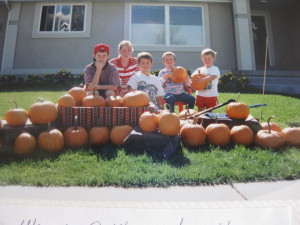Parenting Tip #5: Work Ethic
Teach Your Children to Work
Hi-ho, hi-ho, it’s off to work we go…
In Snow White and the Seven Dwarfs, the dwarfs sing cheerfully with their shovels in hand as they march off to work in the mines. This probably is not the way your children march off to complete their chores. More often the mention of chores brings groans and grumblings. Yet teaching children how to work (and the value of work) is important.
“Teaching children the joy of honest labor is one of the greatest of all gifts you can bestow upon them. Let us also teach our children to see that the work assigned is carried to its completion and to take pride in what they accomplish.” L. Tom Perry
This begs the question: how can we teach them to work and to take pride in their work? I will be the first to admit that this was not my strong suit in parenting. I tried all different kinds of charts, but they only worked for a short period of time, then I’d have to try something new. I did, however, discover something over the years.
Little children actually come with a love of working. My grandson (McKoy) is 1 ½ years old, yet every time he sees a broom he tries to sweep. When I start dusting, he wants to follow along with his own dust cloth. Another grandson (Griffin) is 6 and he loves every opportunity to join in my chores. If I’m raking leaves, he’s right there; if I’m mopping the floor, he’s begging me to let him do it; if I’m baking, he wants to measure, add, and stir.
I think that children are born with a desire to produce good works.
The key is to capitalize on that desire while children are young, then gradually expand their work loads as their abilities and skills increase. Making assignments around the house when they are small prepares them for outside jobs as they mature.
When our two oldest boys were about 10 and 12, they got a paper route. This was just a weekly journal that they delivered to a neighborhood near us. It wasn’t hard work, but it did require getting the job done on a specific day by a specific time. The pay was not great, but they didn’t need a lot of pay at that age. Best of all, my boys learned that work comes before play because deadlines don’t wait.
Our fourth child decided to get a job at age fourteen. He walked over to the horse boarding facility near our house and applied for a job—and got one!! As our other children became old enough, we encouraged them to find jobs. Our encouragement paid off (literally) for our youngest son when he started mowing lawns in the neighborhood. He was able to make more per hour than he could have at a regular job. Plus, he had the benefit of setting his own schedule, so he learned time management.
Our youngest daughter started working at age 14. She spent two years at a water park, then at age 16 started working at a grocery store, a job she held until she graduated from college. Having a long-term job enabled her to learn some skills beyond the basics of showing up for your shift. She learned how to get along with people who have different work ethics, the give-and-take of substituting for others so you can get the same in return, the benefit of friendliness and customer service, and most of all, how to stick with it when you are tired of the routine.
So how did we get them to work? We set the example. Throughout their growing years, my husband and I both worked in the yard and around the house, and we made sure our kids had the opportunity to work beside us. Did they love it? NO! As they got older, they found they would much rather go off with friends, or hibernate in their room, or do almost anything rather than plant the garden, hoe the weeds, or clean the house. But we persevered (consistency!!!).
We tried hard to ensure that their efforts were appreciated and that they had challenging jobs.
Twice I repainted the entire house. The first time my son Stan helped me paint; the second time my daughter Kim worked beside me. These were hard jobs. After we were done, when someone came to the house and commented on the new paint job, I made sure I let them know that Stan/Kim had been major players in the home improvements.
 Because I have four boys—all tall and strong—my neighbor would call and ask if she could hire them to do some work for her. After the first couple of times, she began calling them regularly, explaining that she liked calling these boys because she knew they would work hard and get the job done. This type of feedback helped them to be proud of their work ethic and pushed them to work in a way to hold on to that reputation.
Because I have four boys—all tall and strong—my neighbor would call and ask if she could hire them to do some work for her. After the first couple of times, she began calling them regularly, explaining that she liked calling these boys because she knew they would work hard and get the job done. This type of feedback helped them to be proud of their work ethic and pushed them to work in a way to hold on to that reputation.
Kids need to know that they have the ability to contribute to the family through their work. Every time I did a task myself because it was easier or faster, I sabotaged their growth. Even though they didn’t always do things to my standard (think raggedy mown lawns), they did share the workload. And that’s worth a lot!
I love quotes that explain ideas briefly and often with humor. Here are some of my favorites regarding work:
- “Every job is a self-portrait of the person who does it. Autograph your work with excellence.” (Author unknown)
- “People are born with brains and sometimes with money, but work ethic levels the playing field.” (Ryan Holmes)
- “Hard work spotlights the character of people: some turn up their sleeves; some turn up their noses; and some don’t turn up at all.” (Sam Ewing)
- “Talent is cheaper than table salt. What separates the talented individual from the successful one is a lot of hard work.” (Stephen King)
The only way to get kids to internalize these ideas—that work makes the difference—is through experience. As they learn to work at home and at school, they will begin to see the reward. Once they realize the benefits, they will become self-motivated workers.
Written by Phyllis Rosen
1 thought on “Parenting Tip #5: Work Ethic”
You must be logged in to post a comment.


I can see how proud you are with your children. It just shows how you properly teach them. Cheers to you!